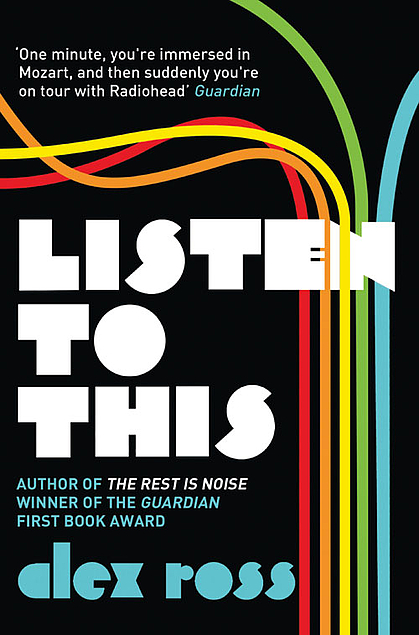Book 3 - Alex Ross "Listen To This"
Jan. 8th, 2021 06:34 pmAlex Ross "Listen To This" (Fourth Estate)

I loved Alex Ross's last book, The Rest is Noise, about 20th Century music, simply because I enjoy such music ever since reading The Wire magazine from 1990. Listen to This, a series of essays running the gamut from Verdi and Brahms to Bjork and Radiohead. What you, dear reader, will get from this book depends on (1) your affinity with the subject matter and (2) your level of music education. Ross is well-educated (obviously), and too often he seems to flex his knowledge to impress his peers and that leaves more pedestrian readers in the dust. It is mostly when discussing classical music that Ross goes over the edge whereas his more contemporary subjects are easier to follow.
It's nice to hear a respected critic cover the gamut of musical styles. Rarely does the general audience look so deeply into contemporary music and with good reason, most of it is shallow and vapid, depending on what angle you come from? Ross picks good subjects though and in fact, I once heard a composer on the radio expounding on the music of Bjork (who happens to be one of my faves).
Ross also covers the deplorable state of music education in the USA, and probably applicable here too but I think he could have done better. In passing, he mentions the academic correlation between music education and academic excellence, and of course, this does not help combat anti-intellectual right-wingers responsible for slashing arts funding in the first place.
The articles are well worth reading, though some (not surprisingly) are on topics of more interest to this reader than others. But that is a good feature in this sort of miscellany. Reading something about a musician or composer in whom the reader has absolutely no interest could (and in this case did) spark some interest, leading to a listen to one of the works in question, and to a broadening of horizons. The first essay stands, which traces a few musical figures through the whole history of "western" music, is of particular interest. It is also demanding, whereas some of the other essays are the non-fiction equivalent of easy listening.
As usual, Ross's writing is a delight; clear, supple, and unusually successful in conveying something about music (so much writing about music brings to mind the quote about dancing about architecture).
In sum, this is a pleasant and perceptive collection of essays by a music critic who is always worth reading. Let's hope that something more major is waiting in the wings.

I loved Alex Ross's last book, The Rest is Noise, about 20th Century music, simply because I enjoy such music ever since reading The Wire magazine from 1990. Listen to This, a series of essays running the gamut from Verdi and Brahms to Bjork and Radiohead. What you, dear reader, will get from this book depends on (1) your affinity with the subject matter and (2) your level of music education. Ross is well-educated (obviously), and too often he seems to flex his knowledge to impress his peers and that leaves more pedestrian readers in the dust. It is mostly when discussing classical music that Ross goes over the edge whereas his more contemporary subjects are easier to follow.
It's nice to hear a respected critic cover the gamut of musical styles. Rarely does the general audience look so deeply into contemporary music and with good reason, most of it is shallow and vapid, depending on what angle you come from? Ross picks good subjects though and in fact, I once heard a composer on the radio expounding on the music of Bjork (who happens to be one of my faves).
Ross also covers the deplorable state of music education in the USA, and probably applicable here too but I think he could have done better. In passing, he mentions the academic correlation between music education and academic excellence, and of course, this does not help combat anti-intellectual right-wingers responsible for slashing arts funding in the first place.
The articles are well worth reading, though some (not surprisingly) are on topics of more interest to this reader than others. But that is a good feature in this sort of miscellany. Reading something about a musician or composer in whom the reader has absolutely no interest could (and in this case did) spark some interest, leading to a listen to one of the works in question, and to a broadening of horizons. The first essay stands, which traces a few musical figures through the whole history of "western" music, is of particular interest. It is also demanding, whereas some of the other essays are the non-fiction equivalent of easy listening.
As usual, Ross's writing is a delight; clear, supple, and unusually successful in conveying something about music (so much writing about music brings to mind the quote about dancing about architecture).
In sum, this is a pleasant and perceptive collection of essays by a music critic who is always worth reading. Let's hope that something more major is waiting in the wings.
no subject
Date: 2021-01-09 02:34 am (UTC)